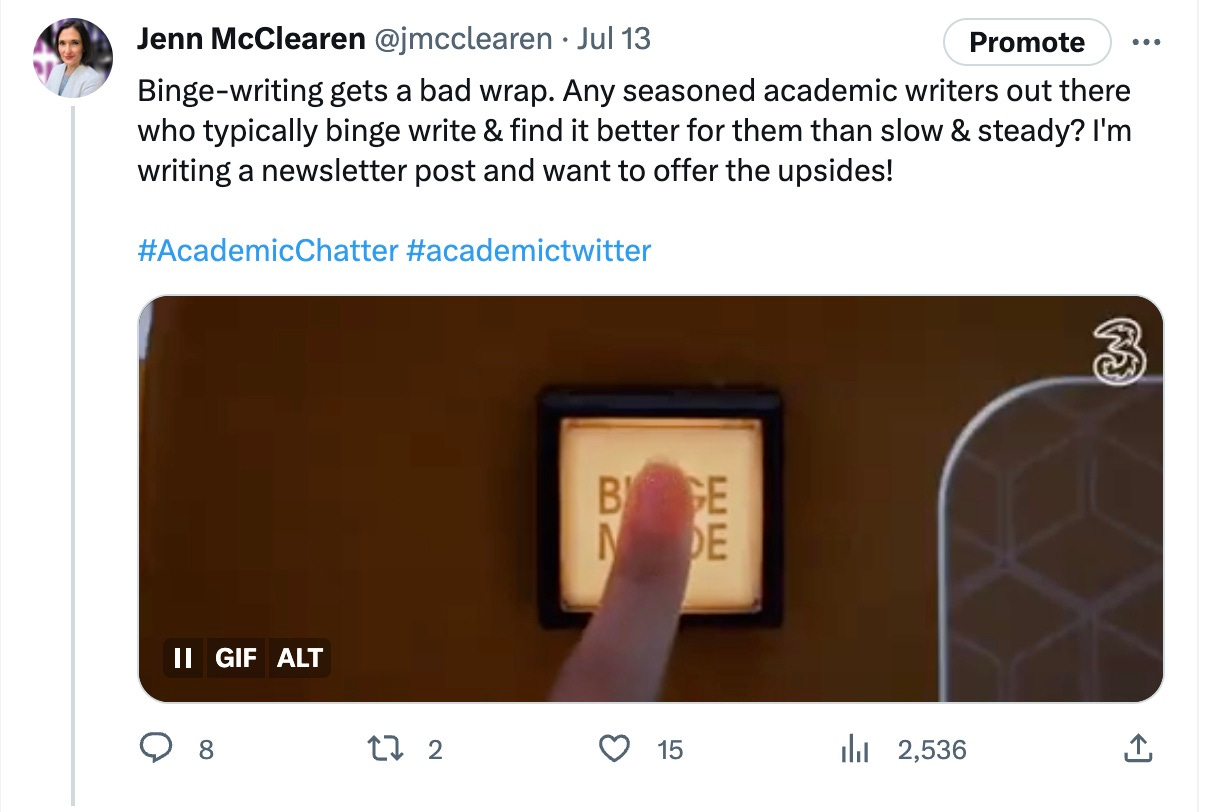In Defense of Binge Writing
What if we binge write because its a form of deep work, rather than just anxiety-ridden procrastination?

One of the core values of Publish Not Perish is accepting that there are many ways to become a successful writer. We avoid dogma and one-size-fits-all solutions. We don’t drink the Kool-Aid and instead ask you to bring your beverage of choice to the party.
But dogma is alluring, and I’ve discussed my own experience with the religion of daily writing here:
It seems that if a writing coach or prolific scholar tells us that THIS is the way we have to do something, we are more likely to pay for their system because they have THE way. The allure of a single, definitive answer to our writing woes is undeniable—it offers the promise of fixing what we perceive as broken.
Point and case: the majority of expert writing advice suggests that we avoid binge writing at all costs. The stereotype of a binger is that you procrastinate until the last minute, write frantically up until a deadline, and then either sleep for days or do not touch any writing projects for an extended period of time because you are exhausted. Some refer to this as the "binge and bust model," claiming that it does not result in your best work and causes you to collapse for a long period of time afterwards.

And let’s be real: what I’ve just described is a negative experience for many people, which is why so many experts advise against it.
But does that mean no one should ever binge? Certainly not. I think it’s also important to consider why some people prefer writing for longer, more intense periods.
Binge writing or deep work?
I’d argue that binge writing is, at its best, a form of deep work. It involves immersing oneself entirely in the writing process and committing to a focused, uninterrupted session of creative output. A state of deep work allows writers to tap into their most profound cognitive abilities, producing high-quality content and fostering a profound connection with their subject matter.
I discuss deep work more fully here:
While binge writing is often associated with moments of intense pressure and procrastination, it's crucial to recognize that, at its core, it mirrors the principles of deep work—a state highly valued by scholars and other creatives.
Writers may choose to binge because that is when they can focus intensely on a project and put other things aside in the name of meeting a deadline. Perhaps the deadline is the excuse they need to enter a hyper-focused state. They find this form of writing practice just works better for their lives, commitments, and responsibilities. After bingeing, they then return to regularly scheduled programming that normally competes for their time.
People cannot stay in a state of binge or deep work all the time and have to have periods of rest, so it makes perfect sense that if you focus intensely on a project for two weeks, working day and night, that you would need a break after that. When we use the words “deep work,” this rest is considered necessary and natural, and when we use the word “binge writing,” we think this is somehow a counterproductive break.
The wisdom of academic Twitter
I asked folks on Twitter why they preferred bingeing to more regular writing patterns, and here are some of the reasons they do:
@LBurns66: I'm a binge writer! With other stuff, I can multitask. With writing, I need to be in "research mode," which means concentrating on my project with as few distractions as possible. I usually write in 2 - 3 hour spurts a few times a day. When I'm on a roll, my breaks get shorter. [I write like this for] 2 - 3 weeks. I'm usually done with the project by then. If not, I find it helps to take about a week off before starting up again in order to recharge.
@drjessmaddox I absolutely am a binge writer. I can sit down and crank out like 3-4K words and then I don’t write again for a week or two. The upsides are it gets the thoughts out of my head, gives me a lot to edit, and gets me thinking about what comes next.
@oliviastowell Usually I mentally work through/research for 1-2 months, then have 3-5 marathon days (spread across a week), then I need time away from the draft for fresh eyes. But “time away” from one project often overlaps with early-stage mental processing for another.
@DrCRMatthews I do both forms, at present in a slow and stead, but I have also done moments where I’ve gone bingy. There’s strengths and weaknesses to both and I’m not one for limiting myself because of what others think. The key will be to find what is effective & healthy in the long term.
You can read other great replies in the thread.
I would also like to note that many of the people who responded to my question are prolific and award-winning authors. While, of course, this is a small, unscientific sample size, I think we can at least use these experiences as reasons to open our minds to the possibility that bingeing has just gotten a bad wrap.
So, dear reader, binge writing isn't inherently negative for everyone, as it often embodies many characteristics of deep work. (Likewise, deep work is not preferable or possible for everyone, which is why there are other strategies.)
Is binge writing right for you?
It’s also crucial to recognize that binge writing isn't universally effective; for some, it becomes an involuntary and stressful habit rather than a conscious choice. For example,
If the act of binge writing induces intense stress and negative emotions about writing during those intense writing periods, it may be time to seek an alternative approach that feels better to you.
If your last-minute binge sessions leave you feeling less than proud of your work, it's worth considering whether this method allows you to put your best work forward.
Should binge writing trigger guilt over neglecting other responsibilities, perhaps exploring alternative writing practices would alleviate this burden.
On the flip side, if you consistently embrace binge writing to tackle projects and find satisfaction in these intense work periods, all while maintaining high-quality results and knowing that you'll be more present for other responsibilities post-binge, then binge your little heart out.
In essence, the key lies in cultivating a writing practice that fosters positive emotions, provides adequate rest intervals—whether it's daily writing, binge sessions, or somewhere in between—and resists any haters who question the legitimacy of your chosen method.
You do you. Your unique writing style is valid as long as it serves your goals and well-being.





I get really distracted if I am not binge writing alone and able to sit down, stand up, turn on the kettle, and then get into the groove. I get to places I can't get to if I am only writing for a short period. Of course, editing, proofing, cleaning things up I can do in shorter periods with distractions (humans I care for) nearby. Right now my life is not set up for me to have little writing retreats (I used to get away/alone time--like house-sitting, or kicking peeps out of my own house, etc. ) which I used to do. With life changes, currently I am trying to write for shorter periods but it's really hard for me. My mind doesn't focus or quiet. I miss my binge writing sessions--has anyone gone through something like this?
I am a deep procrastinator. It helps me to have a deadline...like a paper for a conference. Then I do some gentle, non-urgent writing. The comes a bit of deeper thinking. The last two weeks of finishing is pretty much all binge. I try to remember to leave a day of letting the paper/manuscript rest and a day to read it carefully and make corrections. There is usually also one last day of binging somewhere in there--like when I decide a section isn't working or the argument was more lost than I thought. Right now, I'm all good intentions, but in a deep fallow (a polite word for doing nothing) period.